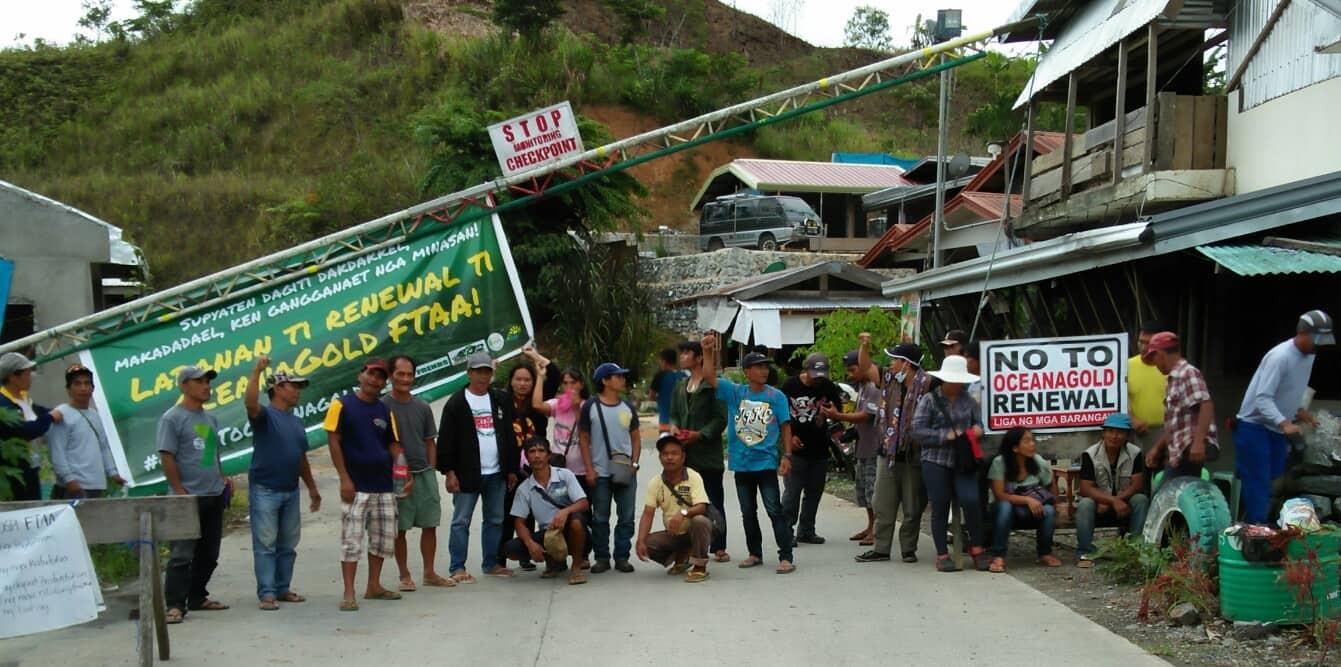(Sydney, Ottawa) The Australian-Canadian mining company OceanaGold has been forced to cease mining for over a month at its Didipio copper-gold mine in Nueva Vizcaya, Philippines. The company faces a restraining order from municipal and provincial elected officials, a blockade of the site by Didipio villagers (most of whom are Indigenous peoples), a lapsed mining permit, and a renewal application that has not been approved by the President of the Philippines.
OceanaGold’s 25-year permit lapsed on June 20, 2019, but the company did not cease mining until local community members started a blockade of the mine on July 1.
Villagers in Didipio have the solidarity of a broad range of Filipino organizations, as well as internationally from Australian and Canadian civil society organisations, among others:
- Protests organised by the Maritime Union of Australia and Canadian solidarity organizations, including MiningWatch Canada, will be held today, 9 August, in Melbourne, Ottawa and Vancouver.
- Also today, MiningWatch Canada and Jubilee Australia released a briefing paper outlining how OceanaGold is ignoring both its lack of a regulatory and a social licence to operate the controversial mine, which has had significant adverse impacts on water, forests, land, biodiversity, Indigenous peoples’ rights, labour rights, and human rights.
In 2006 OceanaGold acquired the Didipio project, located in an important biodiversity corridor, critical watershed, fruit growing and agroforestry hub in the Philippines. The provincial government and mining affected communities have long voiced their opposition to renewal of the mine’s permit in position papers and local petitions. Resistance is led by Nueva Vizcaya Provincial Governor, Carlos Padilla, who released an advisory on the day of the expiration of OceanaGold’s Financial and Technical Assistance Agreement (FTAA) stating that upon the expiration of the contract the agreement “shall be terminated and the parties shall be relieved of their respective obligations”; Governor Padilla followed this up with a restraining order on June 25.
OceanaGold initially defied the provincial government’s restraining order claiming the right to keep operating as the country’s Mines and Geosciences Bureau (MGB) had endorsed the company’s renewal application. However, on July 25 the Regional Trial Court denied OceanaGold’s petition for injunctive relief noting that the company’s right to mine had in fact ceased to exist as of June 20, 2019, as President Duterte had not approved its renewal application. OceanaGold’s renewal process has been contested and opaque. The company now says it lodged its “notice of renewal” in March of 2018 and that a renewal application was submitted in October 2018. However, these steps were taken without consultation with local elected officials and affected communities, who have long expressed concern about the mine’s serious environmental and human rights impacts.
The people’s blockade, started on July 1, is continuing. The company has suspended truck movement and mining and is appealing the Regional Trial Court’s decision.
Allies around the world are showing solidarity with the mining affected communities in an international day of action on 9 August. In Australia, the Maritime Union of Australia is leading a protest outside of OceanaGold’s office in Melbourne, 357 Collins St at 12 noon. Protests are also being organised in Canada outside of the Prime Minister’s office in Ottawa and outside of OceanGold’s office in Vancouver.
“OceanaGold knows it does not have the support of most Provincial, Municipal and village elected officials or of community members in Didipio, which is likely why the company has been so secretive in its licence renewal process,” said Catherine Coumans of MiningWatch Canada, who has visited the local Didipio community three times in the last four years. “The company clearly does not have the Free Prior and Informed Consent of the Indigenous peoples of Didipio as it has not been transparent with them or consulted them and they are now blockading the operation.”
“The evidence clearly suggests that OceanaGold has continued mining operations while the question of the FTAA is still being contested,” said Luke Fletcher of Jubilee Australia. “On 25 July, the Regional Trial Court denied the company’s petition for injunctive relief, further demonstrating that the company is operating there without the proper permissions.”
Media Contacts:
- Dr. Luke Fletcher, Jubilee Australia, [email protected] +61 (0) 435 901 086
- Dr. Catherine Coumans, MiningWatch Canada, [email protected] +1 613 569 3439
